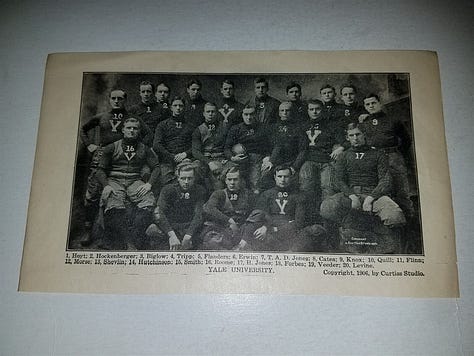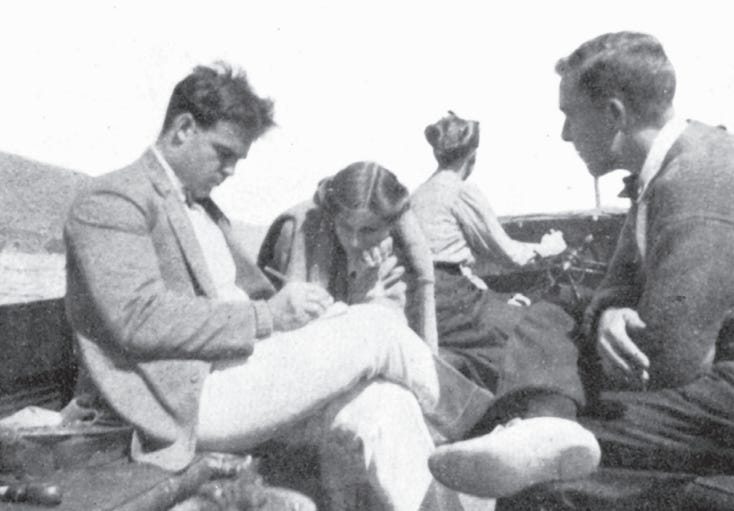William Borden (aka, Borden of Yale) is primarily known for the way God used him during his undergraduate years at Yale University (1905-1909). His biography goes deep into the details of his young life, quoting extensively from his own letters as well as letters from friends, family, and fellow classmates.
Somewhat surprisingly (at least to me) Borden’s love for (and desire to play) football pops up a handful of times. Here are a few interesting examples which give us a fuller picture of the young, athletic William Borden (and a glimpse into a bygone era)...

The first mention of football is in a letter home from high school (The Hill) in Pennsylvania, where Borden evidently played consistently even at fourteen. From October 26, 1902:
We have had three football games so far. The first two were with the Haverford Grammar School and Princeton Freshmen, the score in each game was 0 to 0. The third game was a perfect cinch for us, the score being 41 to 0 in favor of Hill.
About a year later, on November 22, a sixteen-year-old Borden relays a feeling that most athletes (and avid fans) can relate to; the letdown at the end of the season:
Dear Mother—It seems a perfect age since I had any communication with the outside world. We have been to Lawrenceville, and our team got beaten by a score of six to five. It seems awfully strange—the feeling that football is over. It seems unnatural, as if something had come to an end.
Fast forward a couple of years to October 1, 1905, and we get a glimpse of Borden (now almost eighteen) getting ready to try out for Yale’s Freshman football squad:
Dear Mother. . . . I am trying out for the freshman football eleven. As there are ninety-nine others doing likewise, there is a pretty good chance of your wish being fulfilled—that I should not make the team.
This is kind of funny. At first glance, Borden’s mom seems to be an overprotective mother, not wanting her son to get hurt playing a physical sport. However, a quick search will reveal she had some legitimate concerns. 1905 was a deadly year in college football, and powerhouse1 Yale was easily one of the best teams in the country, going undefeated. From Boston1905:
1905 was a tough year in U.S. football--by the end of the season three college players had been killed due to the violence of the game (mass formations and gang tackling were commonplace), and scores more seriously injured. During October, US President Theodore Roosevelt (Harvard ‘80) had called together the coaches of Harvard, Yale, and Princeton to help figure out a way to decrease the body count. "Brutality and foul play should receive the same punishment given to a man who cheats at cards," he opined.



Three weeks later (October 20, 1905) and Borden was evidently still working on making the team. He mentions football practice briefly at the end of a letter about his hectic schedule:
Am I busy? I will tell you what I am doing, and you can judge for yourself.
To begin with I have twelve recitations a week to prepare, which isn’t much, very little in fact. Monday evening at 6:45, Freshman Religious Committee meets in Bill Barnes’ room… Wednesday evening at 6:40, the 1909 Bible Class meets in Dwight Hall. Thursday evening at 6:45, our Mission Study Class meets. And then Sunday. That day starts with Chapel at 10:30. Immediately after this comes our Class Prayer Meeting with which I [am involved and] lead at times. At five in the afternoon there is a meeting of the [Missions] Band, and at 6:40 a general meeting held in Dwight Hall. Besides these things, I intend to go down at least twice a week to the Oak Street Boys’ Club. Then I have been appointed chairman of a committee to promote interest and collect funds for the Yale Hall work here in New Haven and the Yale Mission in China. . .
My exercise, that is football, takes rather more time than I wish it did. . . .
That last letter gives us a better idea of where Borden’s true passion was found. Over and over he speaks of missions and prayer. Football, when it comes up, takes up a bit too much of his precious time2.
One of Borden’s best friends and roommates, Charlie Campbell, fills in some details from that Freshman season:
During this fall [1905] Bill went out for the freshman football team, and played very good ball. He did not make the team but came very near doing so. In fact, in the game against the Princeton freshmen he was told to warm up to go in, but time was called or something of that sort prevented it…
Charlie continued with an inside look at Borden’s physical, mental, and spiritual determination:
Bill was always picking out the toughest proposition and going through thick and thin to win him for Christ. . . . His life, how true it rang! He came to college far ahead, spiritually, of any of us. He had already given his heart in full surrender to Christ – had really done it. He had formed his purpose to become a foreign missionary, and all through college and seminary that purpose never wavered.
One can easily see the advantage this would give a man. His life was determined. We who were his classmates learned to lean on him and find in him a strength that was as solid as a rock, just because of this settled purpose and consecration.
Football, however, was by no means Borden’s only sport, or hobby. His college activities were summarized in the Yale Alumni Weekly as follows3:
He was president of Phi Beta Kappa. In athletics he was active in football, baseball, crew, and wrestling, rowing on the winning 1909 club crew in the fall of junior year, and playing on the winning Philosophical and High Oration baseball team and on the Phi Beta Kappa team. He served on the Class Book Committee and on the Senior Council. Elected a Class Deacon, he devoted himself largely to religious work. He was unwilling to join any fraternity or secret society, because he feared that it might set him apart from the body of the class.
John Magee, one of William Borden’s Yale classmates, and later a missionary to China himself, wrote the following comparing Borden’s physical strength with his spiritual vitality:
No matter if some said he was too religious, or others that he was too narrow, or that he was heavy, there was one thing nobody at Yale ever questioned – that he was strong. He was red-blooded and he had the punch. He played hard and he studied hard and was intense in his religious beliefs. When he bucked the football line, every ounce of his 175 was back of him. When he was elected to the presidency of Phi Beta Kappa, he received the highest scholarship honor in Yale. There was power written all over him. You either followed him or you left him alone. I can vouch that he was the strongest religious force in our class at Yale.
Magee finishes with a glowing commendation of the incomparably strong young Borden, of whom it seems the world indeed “was not worthy”:
He certainly was one of the strongest characters I have ever known, and he put backbone into the rest of us at college, who were interested in the same things but did not have the strength he had. There was real iron in him, and I always felt he was of the stuff martyrs were made of, and heroic missionaries of more modern times.
Some are called to play football. Others are called to spend a lifetime serving in China. Some are called to serve fourteen years in China until being arrested, and banned indefinitely.4
And still others are called to spend more than seven years (graduating from both Yale and Princeton) preparing for a fruitful life and ministry on the mission field in China, only to be called away by the Lord Jesus just three months into their missionary career…
This is the 7th in a series on the life of William Borden, the millionaire missionary who died en route to China's Gansu Province, adapted from his biography (Borden of Yale), which I helped edit for republication (Aneko Press, Jan 1, 2024).
Yale was in its football heyday during Borden’s tenure at the school (1905-09), winning their 16th and 17th National Championships in 1907 and 1909, and a shared championship in 1905.
Full disclosure: I quit baseball in high school because practice ate up too much of my Bible study time.
This and the other quotes in this article are excerpted from Borden of Yale by Mrs. Howard Taylor (Aneko Press, 2024).
You can download my story for free at PrayforChina.us or Pray4Gansu.com.




